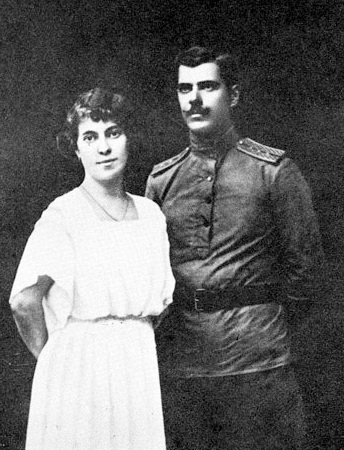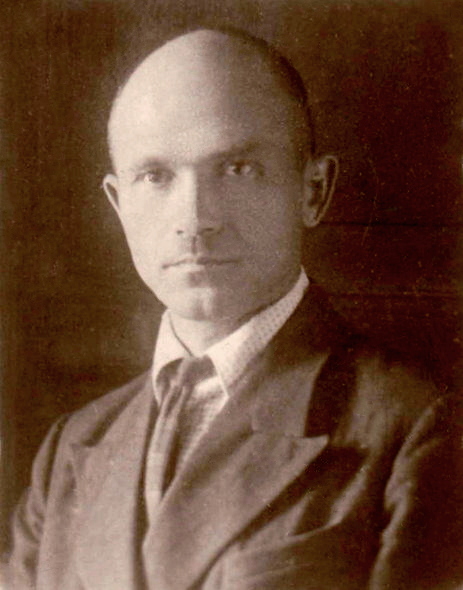|
Belarusian Writers
Below is an alphabetical list of famous novelists, poets, and playwrights, who are Belarusians, Belarusian or of Belarusian origin. A *AleŇõ Adamovińć (1927‚Äď1994), writer and critic. *KastuŇõ AkuŇāa (1925‚Äď2008), writer and journalist. *Svetlana Alexievich, ŇöviatŇāana Aleksijevińć (born 1938), investigative journalist and prose writer. *FranciŇ°ak Alachnovińć (1883‚Äď1944), writer, journalist and Gulag survivor. *Guillaume Apollinaire (1880‚Äď1914), poet, playwright short-story writer and novelist. *Natallia Arsiennieva, Natalla ArsieŇĄnieva (1903‚Äď1997), playwright, poet, and translator. B *Alhierd Baharevich (b. 1975), writer and translator. *Maksim Bahdanovińć (1891‚Äď1917), poet, journalist and literary critic. *FranciŇ°ak BahuŇ°evińć (1840‚Äď1900), poet, writer and lawyer. *Ryhor Baradulin (1935‚Äď2014), poet, essayist and translator *ŇĻmitrok Biadula (SamuiŇā PŇāaŇ≠nik) (1886‚Äď1941), poet, writer and activist. *Alexander Bogdanov (1873‚Äď1928), philosopher and revolu ... [...More Info...] [...Related Items...] OR: [Wikipedia] [Google] [Baidu] |
Belarusians
, native_name_lang = be , pop = 9.5‚Äď10 million , image = , caption = , popplace = 7.99 million , region1 = , pop1 = 600,000‚Äď768,000 , region2 = , pop2 = 521,443 , region3 = , pop3 = 275,763 , region4 = , pop4 = 105,404 , region5 = , pop5 = 68,174 , region6 = , pop6 = 66,476 , region7 = , pop7 = 61,000 , region8 = , pop8 = 41,100 , region9 = , pop9 = 31,000 , region10 = , pop10 = 20,000 , region11 = , pop11 = 15,565 , region12 = , pop12 = 12,100 , region13 = , pop13 = 11,828 , region14 = , pop14 = 10,054 , region15 = , pop15 = 8,529 , region16 = , pop16 = 7,500 ... [...More Info...] [...Related Items...] OR: [Wikipedia] [Google] [Baidu] |
Jan ńĆańćot
Jan Czeczot of Ostoja ( be, –Į–Ĺ –ß–į—á–ĺ—ā, ''Jan ńĆańćot,'' lt, Jonas ńĆeńćiotas, 1796‚Äď1847) was a Polish romantic poet and ethnographer. Fascinated by the folklore and the traditional folk songs of the former Grand Duchy of Lithuania, a confederal part of the Polish‚ÄďLithuanian Commonwealth, he recollected hundreds of them in his works. Inspired by them, he also wrote several poems in what could be considered a pre-modern Belarusian language. As such, he is often cited as one of the first Polish ethnographers and one of the predecessors of the Belarusian national revival. Biography Jan Czeczot was born on 24 June 1796 in a noble family that was part of the Clan of Ostoja family of Tadeusz Czeczot in MaŇāuszyce ( MaluŇ°yńćy, now in Hrodna Voblast) near Navahrudak. He graduated from a Dominican school in Navahrudak and then joined the Vilna Academy in 1816. There, he made friends with many of the predecessors of Polish romanticism, among them Adam Mickiewicz, who is said ... [...More Info...] [...Related Items...] OR: [Wikipedia] [Google] [Baidu] |
UŇāadzimir Karatkievińć
Uladzimir Karatkievich ( be, –£–Ľ–į–ī–∑—Ė–ľ—Ė—Ä –°—Ź–ľ—Ď–Ĺ–į–≤—Ė—á –ö–į—Ä–į—ā–ļ–Ķ–≤—Ė—á; russian: link=no, –í–Ľ–į–ī–ł–ľ–ł—Ä –°–Ķ–ľ—Ď–Ĺ–ĺ–≤–ł—á –ö–ĺ—Ä–ĺ—ā–ļ–Ķ–≤–ł—á) (26 November 1930 ‚Äď 25 July 1984) was a Belarusian romantic writer. Biography Family and childhood Karatkevich's ancestors were of aristocratic class and came from the Belarusian cities Dnieper, Rogachev, Mstislavl, Mogilev and others. One of the writer's maternal relatives, according to family legend - Thomas Hrynkevich, took part in the uprising of 1863. The rebels under his command were defeated, and he himself was shot in Rahańćow. This story Korotkevitch described in the epilogue of the Russian-language novel "Background" (–ü—Ä–Ķ–ī—č—Ā—ā–ĺ—Ä–ł—Ź), and in the prologue of the novel "Can not forget" ("Leonids will not return to the Earth", ¬ę–õ–Ķ–ĺ–Ĺ–ł–ī—č –Ĺ–Ķ –≤–Ķ—Ä–Ĺ—É—ā—Ā—Ź –ļ –ó–Ķ–ľ–Ľ–Ķ¬Ľ). He was born on November 26, 1930, in the city of Orsha, Vitebsk region, into a family of intellectuals. Fath ... [...More Info...] [...Related Items...] OR: [Wikipedia] [Google] [Baidu] |
Ihnat KanńćeŇ≠ski
Ihnat KanńćeŇ≠ski (pen name: Ihnat Abdziralovińć; ; May 1896 ‚Äď 23 April 1923) was a Belarusian poet, philosopher and publicist who is regarded as a leading thinker within the Belarusian independence movement of the early 20th century. Early years KanńćeŇ≠ski was born into the family of a court clerk in Vilnia. In 1913 he graduated from a Vilnia school and was admitted to the St. Petersburg Institute of Technology but the following year transferred to Moscow University. In 1916 he was conscripted into the Russian Imperial Army but after the February Revolution returned to Moscow to continue his education. After a short period of work in Soviet Russia and the newly established Belarusian Soviet Socialist Republic, KanńćeŇ≠ski moved to his native Vilnia which by then had become part of the Second Polish Republic. Later life in Vilnia Once in Vilnia, he dedicated himself to writing, publishing various poems, political articles and reviews. In 1921 his most famous work, "The ... [...More Info...] [...Related Items...] OR: [Wikipedia] [Google] [Baidu] |
KastuŇõ KalinoŇ≠ski
Wincenty Konstanty Kalinowski, also known as KastuŇõ KalinoŇ≠ski ( be, –ö–į—Ā—ā—ÉŐĀ—Ā—Ć –ö–į–Ľ—Ė–Ĺ–ĺŐĀ—ě—Ā–ļ—Ė also be, –í—Ė–Ĺ—Ü—ćŐĀ–Ĺ—ā –ö–į–Ĺ—Ā—ā–į–Ĺ—Ü—ĖŐĀ–Ĺ –ö–į–Ľ—Ė–Ĺ–ĺŐĀ—ě—Ā–ļ—Ė, lit=Vincent Kanstancin KalinoŇ≠ski, lt, Konstantinas Kalinauskas) ( ‚Äď ), was a 19th-century Belarusian writer, journalist, lawyer and revolutionary. He was one of the leaders of the Polish Lithuanian and Belarusian national revival and the leader of the January Uprising in lands of the former Grand Duchy of Lithuania in the Polish‚ÄďLithuanian Commonwealth. One of several participants in the failed January Uprisings, Kalinowski is especially revered in Belarus where he is seen as a forefather and icon of Belarusian nationalism. Early life and education Kalinowski was born in MastaŇ≠liany, in Grodnensky Uyezd of the Russian Empire (now Mostowlany, Poland) to a ''szlachta'' family. The Kalinowski family hailed from the Polish region of Mazovia and bore the Kalinowa coat of arms. His father, ... [...More Info...] [...Related Items...] OR: [Wikipedia] [Google] [Baidu] |
Adam Hlobus
Adam Hlobus (born 29 September 1958 as Vladimir V. Adamchyk, be, –£–Ľ–į–ī–∑—Ė–ľ—Ė—Ä –í—Ź—á–į—Ā–Ľ–į–≤–į–≤—Ė—á –ź–ī–į–ľ—á—č–ļ (transl. Uladzimir Vyachaslavav—Ėch Adamchyk) is a Belarusian writer, novelist, essayist, poet, publisher, and artist. Early and personal life Hlobus was born in Dzyarzhynsk Minsk Region in the family of Belarusian writer Vyacheslav Adamchyk ( be, Vyachaslau Adamchyk). He and his family moved to Minsk in 1959, where he grew up. He graduated from the pedagogical department at the Minsk Art School, and the A.K. Glebov (1977) art department of the Belarusian Theatre and Art Institute (1983). He worked as a draftsman, painter and art restorer, graphic designer, and editor of ''Krynitsa'', a publishing house, established in 1987. He is married to Alena Adamchyk, a Belarusian photographer. He has two children and a grandson. Activism He was one of the founding members of the informal association of young writers known as ''Tuteishyja'' (''Tuteishyja'' ... [...More Info...] [...Related Items...] OR: [Wikipedia] [Google] [Baidu] |
Larysa HienijuŇ°
Larysa HienijuŇ° (Belarusian language, Belarusian: –õ–į—Ä—č—Ā–į –ď–Ķ–Ĺ—Ė—é—ą; August 9, 1910 - April 7, 1983) was a Belarusian poet, writer and active participant of the national movement. Biography Childhood and youth She was born Larysa MiklaŇ°evińć in the estate ŇĹloba«Ēcy (now VaŇ≠kavysk district, Va«Ēkavysk raion, Grodno Region) into the family of a wealthy land-owner. She had many siblings. HienijuŇ° went to a Polish school, in 1928 she successfully completed Va«Ēkavysk Polish Gymnasium. At that time, she got acquainted with the world literature - the Polish, Scandinavian and English classics. She also started writing poetry. Life in Prague On 3 February she married a medical student, Janka HienijuŇ°, who at that time was studying at Charles University, Prague. In 1937, after the birth of their son Jurka, she joined her husband in Prague. There, one of HienijuŇ°s' neighbors was Alexandra Kosach-Shimanovskaya, sister of Lesya Ukrainka - the author whose work has greatly infl ... [...More Info...] [...Related Items...] OR: [Wikipedia] [Google] [Baidu] |
Alés Harun
Al√©s Harun ( be, –ź–Ľ–Ķ—Ā—Ć –ď–į—Ä—É–Ĺ) born as Aljaksandr Uladzimiravińć PruŇ°ynski ( be, –ź–Ľ—Ź–ļ—Ā–į–Ĺ–ī—Ä –£–Ľ–į–ī–∑—Ė–ľ—Ė—Ä–į–≤—Ė—á –ü—Ä—É—ą—č–Ĺ—Ā–ļ—Ė; 11 March 1887 in Minsk – 28 July 1920 in Krak√≥w) was a Belarusian poet, prose writer, dramatist, lyricist and an opinion journalist. He was born on February 27 (March 11) 1887 in Minsk. His father, Uladzimir PruŇ°ynski, a manual labourer and mother, Sophia (n√©e. Zhivitsa), were members of the Catholic community in Minsk. At five years old he could read in Russian and Polish. Later he graduated from the Minsk third city parish school (1897) and a trade school (1902). He worked as a joiner in the carpentry and furniture factory in Minsk. From 1904 he joined the Belarusian Party of Socialist Revolutionaries. In 1907 he began to publish in the newspaper "Nasha Niva". On March 4, 1907, he was arrested for anti-government activities at the underground press on Broad Street in Minsk, where was printed at the time an appeal ... [...More Info...] [...Related Items...] OR: [Wikipedia] [Google] [Baidu] |
CiŇ°ka Hartny
Zmicier Khvedarovich Zhylunovich (Belarusian- lacinka: ŇĻmicier ŇĹyŇāunovińć, Belarusian-Cyrillic alphabet: –ó—Ć–ľ—Ė—Ü–Ķ—Ä –Ė—č–Ľ—É–Ĺ–ĺ–≤—Ė—á, transliterated from Russian: "Dmitri Fyodorovich Zhilunovich") (October 13, 1887 ‚Äď April 11, 1937) was a Belarusian poet, writer and journalist, known under pen name Tsishka Hartny (CiŇ°ka Hartny, –¶—Ė—ą–ļ–į –ď–į—Ä—ā–Ĺ—č), and a political leader. Life In 1904, Zhylunovich joined the Belarusian Socialist Assembly and took part in organizing Belarusian workers. He contributed to the newspaper Nasha Niva and helped in its distribution."ŇĹyŇāunovińć ŇĻmicier" which cites the following sources: "BieŇā. Sav. Enc., vol. 3, 1971, pp. 367‚Äď368; Ant.Adamovich. "Opposition to Sovietization..." N.Y. 1958, p. 193; The Modern Encyclopedia of Russian and Soviet History, vol. 12, 1979, pp. 87‚Äď88; Nioman, Minsk, ... [...More Info...] [...Related Items...] OR: [Wikipedia] [Google] [Baidu] |
Maksim Haretski
Maksim Haretski (18 February 1893 ‚Äď 10 February 1938; be, –ú–į–ļ—Ā—ĖŐĀ–ľ –Ü–≤–įŐĀ–Ĺ–į–≤—Ė—á –ď–į—Ä—ćŐĀ—Ü–ļ—Ė, russian: –ú–į–ļ—Ā–łŐĀ–ľ –ė–≤–įŐĀ–Ĺ–ĺ–≤–ł—á –ď–ĺ—Ä–ĶŐĀ—Ü–ļ–ł–Ļ), also known as Maksim Harecki and Maksim Goretsky, was a Belarusian prose writer, journalist, activist of the Belarusian national renewal, folklorist, lexicographer, and professor. Maksim Harecki was also known by his pen-names ''Maksim BieŇāarus, M.B. BieŇāarus, M.H., A. MŇõcisŇāaŇ≠ski, Dzied KuŇļma, Maciej MyŇ°ka,'' and ''Mizeryjus Monus''. In his works he often appeared as ''KuŇļma Batura, Liavon Zaduma.'' Maksim Harecki was born in village of MaŇāaja BahańákaŇ≠ka in a peasant's family. He had two brothers ‚Äď HaŇ≠ryŇāa and Ivan. In 1913 Harecki graduated from a college in Hory-Horki, and in 1916 from a military college in Petrograd. During the First World War he served in the Russian Army. He was wounded on October 25, 1914, and had to recover in the military hospitals of Vilnia, Moscow and Mah ... [...More Info...] [...Related Items...] OR: [Wikipedia] [Google] [Baidu] |
Sasha Filipenko
Sasha Filipenko (russian: –°–į—ą–į –§–ł–Ľ–ł–Ņ–Ķ–Ĺ–ļ–ĺ, be, –°–į—ą–į –§—Ė–Ľ—Ė–Ņ–Ķ–Ĺ–ļ–į) is a Belarusian writer, journalist, and TV show host. His books were translated into more than 15 languages. His play ''The Ex-son'' was banned in Belarus and premiered in Kyiv, Ukraine, instead. In 2021 PEN International declared Filipenko a victim of censorship. He currently lives in Switzerland with his wife and son, since it is dangerous for him to come back to Belarus. For openly opposing Alexander Lukashenko and supporting Maria Kalesnikava Filipenko can be prosecuted - official press (Sovetskaya Belorussiya ‚Äď Belarus' Segodnya) mentions quotes of the Criminal Code (articles up to 12 years in prison) that can be applied to Filipenko. Biography Filipenko was born in Minsk into a mixed Russian-Ukrainian family, studied in an arts lyceum, and got his BSc (2007) and MSc (2009) in literature in Saint-Petersburg University. Filipenko worked at the Russian independent TV channel Dozhd. Fili ... [...More Info...] [...Related Items...] OR: [Wikipedia] [Google] [Baidu] |
Vintsent Dunin-Martsinkyevich
Vintsent Dunin-Marcinkievińć ( be, –í—Ė–Ĺ—Ü—ć–Ĺ—ā (–í—Ė–Ĺ—Ü—É–ļ) –Ē—É–Ĺ—Ė–Ĺ-–ú–į—Ä—Ü—Ė–Ĺ–ļ–Ķ–≤—Ė—á; pl, Wincenty Dunin-Marcinkiewicz; February 8, 1808 – December 21, 1884) was a Polish- Belarusian writer, poet, dramatist and social activist and is considered one of the founders of the modern Belarusian literary tradition and national school theatre.–Ē—É–Ĺ—Ė–Ĺ-–ú–į—Ä—Ü—Ė–Ĺ–ļ–Ķ–≤—Ė—á –í—Ė–Ĺ—Ü—ć–Ĺ—ā / –ú—č—Ā–Ľ—Ė—Ü–Ķ–Ľ—Ė —Ė –į—Ā–≤–Ķ—ā–Ĺ—Ė–ļ—Ė –Ď–Ķ–Ľ–į—Ä—É—Ā—Ė: –≠–Ĺ—Ü—č–ļ–Ľ–į–Ņ–Ķ–ī—č—á–Ĺ—č –ī–į–≤–Ķ–ī–Ĺ—Ė–ļ. –ú–Ķ–Ĺ—Ā–ļ: –Ď–Ķ–Ľ–į—Ä—É—Ā–ļ–į—Ź –≠–Ĺ—Ü—č–ļ–Ľ–į–Ņ–Ķ–ī— ... [...More Info...] [...Related Items...] OR: [Wikipedia] [Google] [Baidu] |




